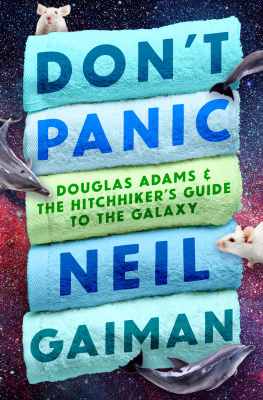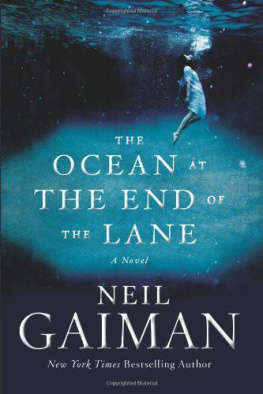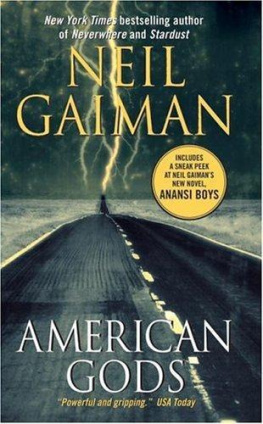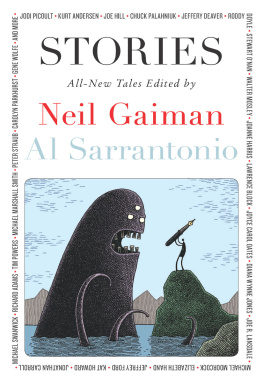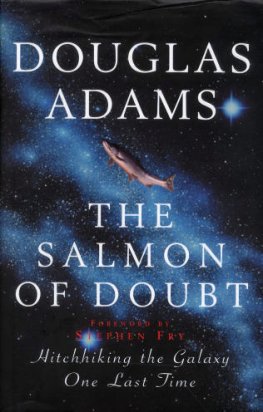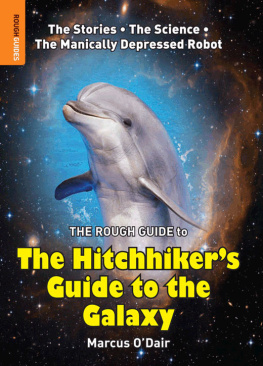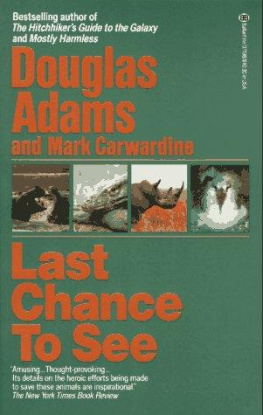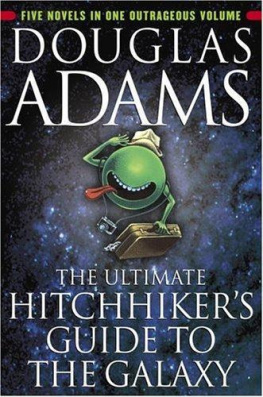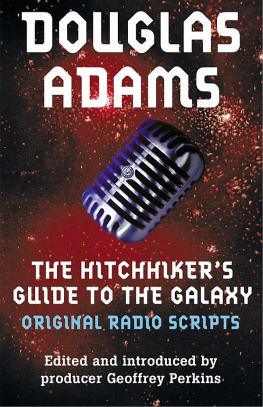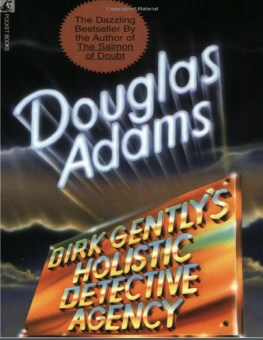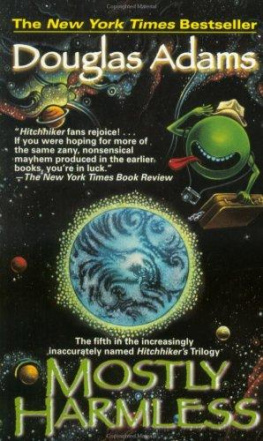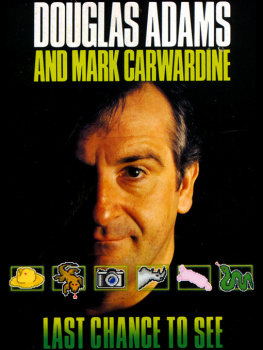Pagebreaks of the print version



Dont Panic
Douglas Adams & The Hitchhikers Guide to the Galaxy
Neil Gaiman
Additional material by David K. Dickson, MJ Simpson, and Guy Adams
Because shes threatened me with consequences too dreadful to consider if I dont dedicate a book to her
And because shes taken to starting every transatlantic conversation with Have you dedicated a book to me yet?
I would like to dedicate this book to intelligent life forms everywhere.
And to my sister, Claire.
FOREWORD
Seventeen years ago a young writer was asked to write a Hitchhikers Guide to the Galaxy companion. Douglas Adams had agreed some years before that Titan could publish such a book, but the original writer, Richard Hollis, hadnt written it for reasons Im still not clear on to this day, and someone at Titan had asked Kim Newman if he wanted to write it. He didntbut, he pointed out, he knew someone who had already interviewed Douglas several times.
So Nick Landau, of Titan Books, called me, and asked if I was interested. I wanted to write this book more than anything. I said yes.
Douglas Adams opened his address book to me. I talked to his colleagues, and went through his filing cabinets. I read dozens of scripts and photocopied all of Douglass press clippings. I played the Hitchhikers computer game to the end, and battled with primitive word processing programs trying to find one that would let me do footnotes. My favourite bits were interviewing Douglas, though, and the way hed manage to be funny, and serious, and faintly baffled, all at the same time.
You will find many of the great Hitchhikers anecdotes in this book (although several of them, such as the tale of the thousands of people blocking the streets for the first Forbidden Planet book signing, had not yet evolved in early 1987 when the greater part of the book was written).
, and overhauled the entire text.
When Douglas died I found myself being interviewed, in newspapers and on the radio, Douglass favourite medium, being asked to explain who he was and what he did, and why his absence was a tragedy. Perhaps, it occurs to me now, at the end of the day, one of the most magical things about Douglass writing, as with that of his literary hero P. G. Wodehouse, was that you knew the person writing was on your side, that he was not laughing at you, but that you were in on the joke.
Back in 1987 Douglas was bemused by the existence of this book, and doubly bemused by its success. What he would make of a world in which we have not only this but MJ Simpsons not-actually-authorised-but-by-no-means-unauthorised Douglas Adams biography, Hitchhiker, and Nick Webbs forthcoming actually-officially-authorised biography Wish You Were Here, I hesitate to think.
I wish he were still around. Id send him an e-mail and ask him. And hed write back something serious and funny and faintly baffled, all at the same time.
Neil Gaiman
July 8, 2003
Late
Now, in fact, for a third time, with Guy Adams slightly revising chapter 30, writing chapters 31-37 and updating appendix ii.
INTRODUCTION
The Hitchhikers Guide to the Galaxy is the most remarkable, certainly the most successful book ever to come out of the great publishing companies of Ursa Minor. It is about the size of a paperback book, but looks more like a large pocket calculator, having upon its face over a hundred flat press-buttons and a screen about four inches square, upon which any one of over six million pages can be summoned almost instantly. It comes in a durable plastic cover, upon which the words
DONT PANIC
are printed in large, friendly letters.
There are no known copies of The Hitchhikers Guide to the Galaxy on this planet at this time.
This is not its story.
It is, however, the story of a book also called, at a very high level of improbability, The Hitchhikers Guide to the Galaxy; of the radio series that started it all; the six-book trilogy it comprises; the computer games, towel, and television series that it, in its turn, has spawned.
To tell the story of the bookand the radio series, and the towelit is best to tell the story of some of the minds behind it. Foremost among these is an ape-descended human from the planet Earth, although at the time our story starts he no more knows his destiny (which will include international travel, computers, an almost infinite number of lunches, and becoming mindbogglingly rich) than an olive knows how to mix a Pan Galactic Gargle Blaster.
His name is Douglas Adams, he is six foot five inches tall, and he is about to have an idea.
THE HITCHHIKERS GUIDE TO EUROPE
The idea in question bubbled into Douglas Adamss mind quite spontaneously, in a field in Innsbruck. He later denied any personal memory of it having happened. But its the story he told, and, if there can be such a thing, its the beginning. If you have to take a flag reading THE STORY STARTS HERE and stick it into the story, then there is no other place to put it.
It was 1971, and the eighteen year-old Douglas Adams was hitch-hiking his way across Europe with a copy of The Hitchhikers Guide to Europe that he had stolen (he hadnt bothered borrowing a copy of Europe on $5 a Day; he didnt have that kind of money).
He was drunk. He was poverty-stricken. He was too poor to afford a room at a youth hostel (the entire story is told at length in his introduction to The Hitchhikers Guide to the Galaxy: A Trilogy in Four Parts in England, and The Hitchhikers Trilogy in the US) and he wound up, at the end of a harrowing day, flat on his back in a field in Innsbruck, staring up at the stars. Somebody, he thought, somebody really ought to write a Hitchhikers Guide to the Galaxy.
He forgot about the idea shortly thereafter.
Five years later, while he was struggling to think of a legitimate reason for an alien to visit Earth, the phrase returned to him. The rest is history, and will be told in this book.
The field in Innsbruck has since been transformed into an unremarkable section of autobahn.
When youre a student or whatever, and you cant afford a car, or a plane fare, or even a train fare, all you can do is hope that someone will stop and pick you up.
At the moment we cant afford to go to other planets. We dont have the ships to take us there. There may be other people out there (I dont have any opinions about Life Out There, I just dont know) but its nice to think that one could, even here and now, be whisked away just by hitchhiking.
Douglas Adams, 1984.
DNA
Deoxyribonucleic acid, commonly known as DNA, is the fundamental genetic building block for all living creatures. The structure of DNA was discovered and unravelled, along with its significance, in Cambridge, England, in 1952, and announced to the world in March 1953.
This was not the first DNA to appear in Cambridge, however. A year earlier, on 11th March 1952, Douglas Noel Adams was born in a former Victorian workhouse in Cambridge. His mother was a nurse, his father a postgraduate theology student who was training for holy orders, but gave it up when his friends managed to persuade him it was a terrible idea.

